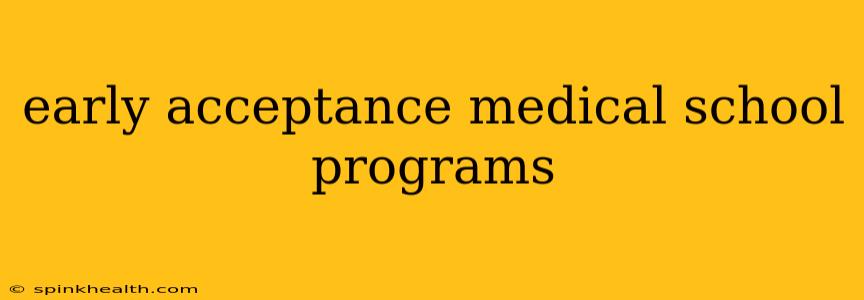The dream of becoming a doctor is a powerful one, often nurtured from a young age. The journey, however, is long and demanding, requiring years of rigorous study and intense competition. For many aspiring physicians, the prospect of securing a spot in medical school feels daunting. That's where early acceptance medical school programs come into play, offering a beacon of hope and a structured pathway to realizing this ambitious goal. But what exactly are these programs, and are they right for you?
This isn't just a simple yes or no answer. Let's delve into the world of early acceptance programs, exploring their intricacies and helping you navigate this crucial decision.
What are Early Acceptance Medical School Programs?
Early acceptance programs, also known as guaranteed admission programs or similar variations, are agreements between a medical school and undergraduate students. These programs essentially guarantee admission to medical school provided the student successfully completes specific prerequisites and maintains a certain GPA and MCAT score. Imagine it as a conditional acceptance—a promise from the medical school contingent on fulfilling predetermined academic milestones.
How do Early Acceptance Medical School Programs Work?
Think of these programs as a carefully orchestrated dance between ambition and rigorous academic achievement. The process usually unfolds like this:
-
Application: Students apply to the early acceptance program during their undergraduate years, often towards the end of their sophomore or beginning of their junior year. This application typically involves submitting transcripts, letters of recommendation, and a personal statement highlighting their commitment to medicine.
-
Acceptance: If selected, the student receives conditional acceptance into medical school. This means their spot is secured, provided they meet the program's academic requirements throughout the remainder of their undergraduate studies.
-
Requirements: These requirements are strictly defined and vary between programs. They generally encompass a minimum GPA (often a high one, such as 3.7 or higher), a target MCAT score, and successful completion of specific prerequisite courses. Failure to meet these benchmarks could result in the revocation of the conditional acceptance.
-
Mentorship: Many programs also provide mentorship and support, guiding students through the challenging undergraduate years and preparing them for the rigors of medical school. This is invaluable, offering personalized guidance and fostering a sense of community.
-
Medical School Entry: Upon successful completion of all requirements, the student automatically gains admission to medical school without having to go through the standard, highly competitive application process again.
What are the Advantages of Early Acceptance Medical School Programs?
The allure of early acceptance programs is undeniable. The primary benefits include:
-
Reduced Stress: Knowing you have a guaranteed spot in medical school significantly alleviates the pressure of the highly competitive regular admissions process. You can focus your energy on excelling academically and enriching your experiences rather than agonizing over applications.
-
Structured Pathway: These programs provide a clear roadmap to medical school, guiding you through the necessary steps and requirements. This structure is particularly beneficial for students who thrive in a well-defined environment.
-
Mentorship and Support: The access to mentorship and advising is invaluable. These programs often provide resources and support networks that are unavailable to students navigating the medical school application process independently.
-
Early Start on Medical School Prep: The early acceptance allows students to begin preparing for medical school earlier, giving them a head start in terms of research, shadowing, and extracurricular activities.
What are the Disadvantages of Early Acceptance Medical School Programs?
Despite the significant advantages, it's crucial to acknowledge potential drawbacks:
-
Limited Choices: Early acceptance often means committing to a specific medical school, potentially limiting your choices regarding location, program specialization, and overall environment.
-
Rigorous Requirements: The academic demands are stringent. Failure to meet the specified GPA and MCAT score requirements could jeopardize your acceptance, making it a high-stakes undertaking.
-
Potential for Burnout: The pressure of maintaining a high GPA and preparing for the MCAT while dealing with the typical undergraduate experience can lead to burnout.
-
Lack of Flexibility: Once accepted, changing your mind about your medical school choice can be very difficult, as your acceptance hinges on meeting the predetermined stipulations of the program.
Are Early Acceptance Medical School Programs Right for Me?
The decision of whether or not to pursue an early acceptance program is highly personal. It requires careful consideration of your academic strengths, personality, and long-term goals. Honest self-assessment and a thorough understanding of the program's requirements are crucial. Consider these questions:
-
Am I a highly motivated and organized student? These programs require exceptional discipline and time management skills.
-
Can I handle the pressure of maintaining a high GPA and MCAT score? The stakes are high, and the consequences of not meeting the requirements are significant.
-
Am I willing to commit to a specific medical school? Early acceptance limits your choices and flexibility.
-
Do I benefit from structured learning and support? Mentorship and guidance are central aspects of these programs.
How Do I Find Early Acceptance Medical School Programs?
Research is key. Start by visiting the websites of medical schools that interest you. Many schools will clearly outline their early assurance or early acceptance programs. Additionally, pre-med advisors at your undergraduate institution can provide invaluable guidance and resources in your search.
The journey to becoming a doctor is challenging but incredibly rewarding. Early acceptance programs can offer a structured pathway, reducing stress and providing valuable support. However, careful consideration of the advantages and disadvantages is crucial to ensure that it aligns with your individual needs, goals, and academic capabilities. Your success hinges not just on the program itself, but on your commitment, resilience, and unwavering dedication to pursuing your dream.

